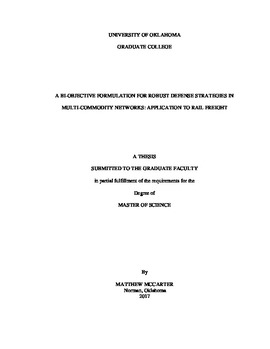| dc.contributor.advisor | Barker, Kash | |
| dc.contributor.author | McCarter, Matthew | |
| dc.date.accessioned | 2017-05-05T20:04:07Z | |
| dc.date.available | 2017-05-05T20:04:07Z | |
| dc.date.issued | 2017-05 | |
| dc.identifier.uri | https://hdl.handle.net/11244/50707 | |
| dc.description.abstract | Characterizing system performance under disruption is a growing area of research, particularly for describing a system’s resilience to a disruption event. Within the framework of system resilience, this study approaches the minimization of a multiple-commodity system’s vulnerability to multiple disruption events. The vulnerability of a system is defined by the degree to which commodities can no longer flow through the system to satisfy demand given a disruptive event. A multi-objective formulation is developed to find defense strategies at minimal cost that maintain a high level of demand satisfaction across all commodities. A solution method involving an estimation of the Pareto frontier via the Non-dominated Sorted Genetic Algorithm II (NSGA-II) is also proposed. A decision support environment is proposed and supported by application of the Technique for Order of Preference by Similarity to Ideal Solution (TOPSIS). The proposed formulation and solution method are illustrated with an example generated from the multi-commodity Swedish rail network. | en_US |
| dc.language | en_US | en_US |
| dc.subject | Engineering, System Science | en_US |
| dc.subject | Engineering, Industrial | en_US |
| dc.title | A Bi-Objective Formulation for Robust Defense Strategies in Multi-Commodity Networks: Application to Rail Freight | en_US |
| dc.contributor.committeeMember | Nicholson, Charles | |
| dc.contributor.committeeMember | Raman, Shivakumar | |
| dc.date.manuscript | 2017-05 | |
| dc.thesis.degree | Master of Science | en_US |
| ou.group | College of Engineering::School of Industrial and Systems Engineering | en_US |
| shareok.nativefileaccess | restricted | en_US |
